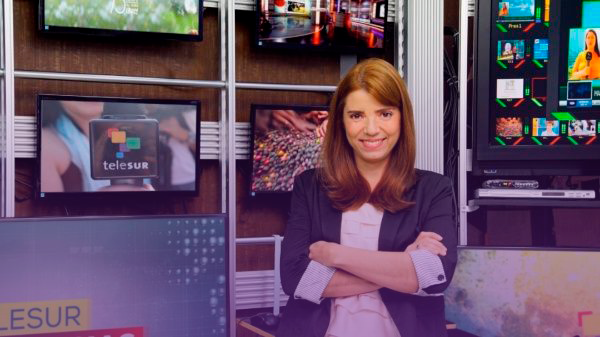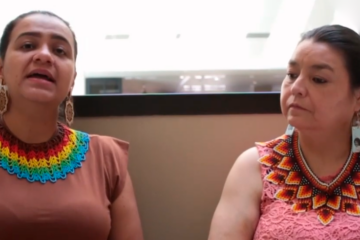Telesur was broadcast for the first time on July 24th, 2005 in Caracas, Venezuela. Its launch date was intentionally planned, as it was the date of birth of Simón Bolívar. Amid imperialist attacks and blockades against Venezuela, Telesur has consolidated itself and became an international outlet, forging alliances across Latin America and the Caribbean. It has reported live revealing to the world coups including the one in Honduras in 2009, and fought disinformation from hegemonic media, including in Libya’s case in 2011.
The Colombian journalist and Telesur co-founder Patricia Villegas moved to Caracas “when Telesur was a project on a piece of paper.” That year, in Venezuela, they were looking for communicators from different Latin American countries, and it was through a leader of the workers’ movement from Valle del Cauca, who was then mayor of Cali, that they learned about Patricia and invited her to join the project. “My life completely changed. I moved to Caracas feeling very confident, it was a moment when the Bolivarian project was greatly expanding. Not only was Telesur born, but also Alba and all these tools of the Bolivarian project personified by Commander Hugo Chávez.”
Today we celebrate 18 years of Telesur with this interview conducted by Capire with Patricia Villegas.
When you look back, you see your ability to resist, to reinvent yourself, and reorganize your own life for a collective project. That’s Telesur.
What are the challenges involved in creating, supporting, and developing an international TV network in a country that endures imperialist sanctions and siege?
When Venezuela’s energy system was attacked [in 2019], the country was in the dark and Telesur continued to operate. It also hosted other media outlets that were using its facilities. These were very difficult times, but there we were. This is proof of personal and institutional resistance. You have a conviction that the cause is fair and that you must do whatever it takes to keep objective conditions. We’ve had people resisting for months with no pay, suppliers resisting for months with no pay. In the first few years, we managed to build good technology infrastructure that, even without new investments in these difficult years, has been able to support us. We have never intended to just resist, but also move forward. This is why, amid such complex situations, we created the English channel six years ago.
When Telesur was born, it was a favorable moment, and then it was more necessary when times were unfavorable. There had to be a number of circumstances for the channel to be born. The context of a favorable moment is very relevant. Venezuela was getting out of a process of economic and military coup, which was also a media-led coup. Chávez came back with a number of ideas, including the idea to build an internal and external communications effort to tell the truth about Venezuela. And then a Venezuelan media policy was born that strengthened grassroots communications. This is combined with the Bolivarian idea of patria grande [great homeland], brought back by Commander Chávez, and which was found in this favorable regional scenario.
Then, unfavorable times made it harder for us to grow internally. We had to reinvent it, as well as reinvent our ways of doing things. That moment, the relationship that had been built since the beginning with the organized Latin American grassroots movement was fundamental.
I’ll give you an example, when reports started to emerge from Ecuador of people dying of COVID-19 in their homes and not having public health care services to collect and bury them. People were scared of this frightening disease and they were leaving bodies out on the streets. The president of Ecuador said that was a lie. We had previously held our first grassroots journalism workshops with social movements, so we called those people who had been to Caracas taking part in our courses. We told them, “We need to prove this information.” With them, we went door to door asking people, and this is how we were able to tell this story the government was refusing to acknowledge. There are many other cases that same way that have allowed us to continue to fulfill our task to inform.
This is how it has been done, even though we did not have the capacity to move equipment from one place to the other, because that requires logistics and infrastructure—not to mention that the blockade against Venezuela has a financial character to it. Any transaction anyone can simply carry out today is very complicated for Venezuela. In multimedia journalism, the news is fast, you can’t wait. You have so many obstacles to overcome, you start to create alternatives. This is what has happened over the course of the years.
What have been striking situations and challenges related to this ability Telesur has to be out there, broadcasting the news live?
Since the beginning, the challenge was to compete technically and aesthetically with the world’s so-called big media channels—but featuring our story, the angles of our stories, and, now, I would say the truth of the facts. We are changing the analysis of media discourse. When Telesur was first born, it was basically a TV channel. Digitation and multi-platforms came along later, and that required us to learn how to tell stories to different audiences.
Telesur was born in 2005 amid this whole political context within Venezuela. In the regional context, to me, it is really born during the coverage of the coup in Honduras. It was election day. Very early in the morning, one of our correspondents in Tegucigalpa goes to the seat of government. A few minutes later, she calls me and says, “I’m going to send you the feed, because someone has went into the building, something happened.” I remember being in the news room and watching the first footage and it was clearly unequivocal. You couldn’t question the footage because it was live. Telesur then reports to the world that President Zelaya’s whereabouts are unknown. We did not know where they had taken him. So having all this story reported live and being able to broadcast it was essential. CNN was in Tegucigalpa that same morning—why didn’t they report on it? They didn’t because they wouldn’t.
In many tough, difficult moments over the years, Latin America’s recent history could have been different if there were not Telesur cameras on site to report on these stories exactly as they happened.
How has the distribution strategy been built to deliver Telesur’s production?
Since the beginning, we have made sure to deliver our signal every possible way. We have made alliances with everyone, including smaller channels. We were not dismissive of anyone due to their size, nor were we blinded by the big ones. In Latin America, it is as important to be a point of reference for a local radio station as it is to be a strategic ally with a big Chinese channel. If Macri took us out of Argentina’s basic cable TV package, people would still be able to find us elsewhere. That doesn’t mean this wouldn’t affect us—but it would not eliminate us, it would not wipe us off the map, which unfortunately has happened to other comrades.
It is not just about delivering the signal, but also being able to produce content with other channels and media outlets. The blockade of reality in the region was really strong and we were interested in finding pathways and ways to bypass that blockade a bit. That’s when shows with Russian, Iranian, and Chinese partners were born. Global alliances have allowed us to tell what Telesur is to other audiences. Then there’s the work with Maradona—which I believe is one of the great experiences. The fact that Maradona has become so closely connected to Telesur is remarkable. This false idea that sports and politics don’t go together is out the window when you have Maradona on Telesur.
There is a political agenda for communication as a right, which includes democratizing communications and, currently, the conversation around digital and technology sovereignty in connection with communication. Based on Telesur’s experience, which was born out of this perspective that communication is a right, how have you seen the evolution of this political agenda?
Eighteen years ago, this conversation was really niche. The general public was not really aware of how the media lied and how these lies influenced their opinions on nearly everything. Today things have changed. This change allows Telesur to show that, when there is a truth, this truth is respectable. You may move the foundations of your building, but you have the truth. In other words, you learn that Zelaya’s house was gunned and that there were kids playing at the Green Square in Tripoli, Libya, and it was not being bombed.
This conversation about the role of the media in building personal and public opinion about certain topics today is something no one questions anymore. The reasons why this happens today are many and varied. The world of telecommunications at the technical level and the level that wages a battle for the meanings of history is very intense and frantic. Tomorrow, the ways of proceeding and doing things will change. We have been seeing this over the course of 18 years, speaking about building means of communication with other criteria that are not commercial ones, but with the same impact and reach of commercial outlets—and not losing our principles, because there are people who are doing “alternative communication,” but ultimately close their news program with footage of women being sexualized. The interesting thing is to be able to build citizenship through media with criteria, principles, and values.
In addition to the struggle to produce distinctive content—which I believe includes producing content people will talk about and also look for other sources beyond those a journalist has in their notebook—, the political communication agenda entails two things. One is literacy, which is not specifically the job of journalists or the media, but has to do with public policies. We must demand states to teach their citizens to understand these new media platforms and understand where their fallacies lie. We have shown before that we are able to learn and become literate. For example, Cubans used their “Yo, sí puedo” [“Yes, I can”] method to basically teach poor Latin Americans and Caribbeans how to read and write. Why can’t we do this now? I believe in utopias, because I have been lucky and responsible to be building one. Another important thing is about building our own pathways.
We have to continue to put our content on all their pathways, we must be competitive in terms of aesthetics, narratives, without losing our essence. But if we don’t create our own pathways, they will continue to censor us.
Telesur lost two million followers overnight on YouTube, which decided to shut down our channel. We had to start over. Now we have over 30,000 followers. YouTube is the big screen—you can’t not be there. But these are their rules and formulas. Tomorrow this could happen again, and there is no one, not even to complain to. Something worse happened to our English-language Facebook page. They put porn on our channel, so Facebook censored and blocked us. Even though we were complying with all their rules and requested our passwords back, we had to start over. All that in a moment when Telesur is an alternative news source with great global reach.
Today our work is not only about producing content—it is about knowing where to aim the camera, how to tell a story, and make it appealing. Concurrently, in order to have a chance to wage a battle—and I’m not even talking about winning—, we must really work on digital literacy and on building our own pathways.




